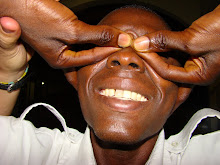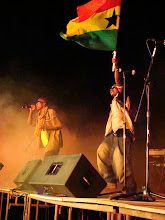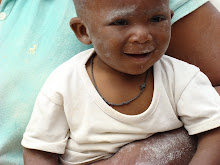BUDUBURAM, Ghana__Dust clouds billow across the roadside entrance to Buduburam, where stagnant channels of sewage meander around crumbling homes. Residents tread footpaths littered with refuse, from discarded water bags to dead mice, and the stench of urine overwhelms the neighborhood. Twenty-seven miles beyond the limits of the bustling Ghanaian capital of Accra, Buduburam provides only tentative asylum for Liberia’s refugees.
Throughout the camp, refugees attest that Ghanaian citizens have received UN identification cards with Liberian names and traveled to western nations such as America, Australia, and Norway under false identities.
Twenty refugees claim that members of the United Nations High Commission for Refugees (UNHCR) have been accepting bribes and granting Ghanaians access to refugee resettlement programs for the past fifteen years.
Buduburam was founded by the UNHCR on September 3, 1990 as a refuge for Liberians fleeing the civil war that began in 1989. It was designed to house only 3000 refugees, but with 14 years of civil war and despotism in Liberia, refugees have flooded steadily into Ghana, overwhelming the camp for the past two decades.
At its peak in 2003, Buduburam contained 45,000 refugees, roughly the population of Minneapolis, Minnesota. Since 2004, the UNHCR has been urging Liberians to repatriate to their homeland, leaving only 27,500 at the latest census.
Very few refugees have been reintegrated, or locally settled in Ghana, and the vast majority of Ghanaians express distrust and derision towards Liberian nationals residing in Buduburam, often citing the notion that they are parasites living off the Ghanaian government.
Prior to 2004, a third option known as resettlement was available to refugees in Buduburam, however some 20 refugees interviewed attest that identity fraud has long been complicating access to this program.
Emmanuel Bashir says he “learned that 9,000 Ghanaians have traveled under Liberian status,” roughly two-fifths of the 22,000 refugees resettled since the camp opened. Other refugees believe that a majority of those resettled over the past 18 years have in fact been Ghanaians.
While there is no official record to substantiate this data, it merits some consideration given the scale of this claim among the refugee population. Even former residents such as Andrew Kamara, a Sierra Leonean who has been successfully resettled in America for over six years, confirm the allegation of widespread identity fraud throughout the camp’s history.
“That's exactly what was going on while I was staying in that camp. Even Ghanian officials working for the U.N. in Accra were involved in that deal,” Kamara, claims.
The UNHCR has refused to comment on this accusation, and camp officials downplay its severity. Team Head and founder of the UN supported Neighborhood Watch Team (NEWAT), Emmett Tumbay confirms that cases of identity theft have come before the police and several have been referred to the UNHCR.
According to Tumbay, the UN doesn’t waste their time on cases of identity fraud unless they are compounded by other crimes, “then they press charges.”
With many Ghanaians living in extreme poverty themselves and a deficiency in international mediators, the temptation for corruption is tangible. Tumbay believes that bribery may be facilitating this process, but admits the difficulty in gathering evidence of such corruption.
The administration of the camp falls to the camp manager, appointed by the Ghanaian government, and the Liberian Refugee Welfare Council (LRWC). Though the Welfare Council was designed to directly represent the interests of the refugees, this supreme governing body of the camp is hand picked by the camp manager and controlled by Ghanaian officials.
“No one represents the refugees,” Francis Siepoh, who arrived on camp in 1992, states, describing the extensive corruption he has observed within the administration of the camp.
Without adequate representation, the refugees are struggling to meet their needs and yearning to be heard.
Acting as a “mouthpiece” to facilitate communication between the refugees, United Nations, and Ghanaian government, the Chairman of the LRWC describes his post as that of a critical intermediary. Varney Bamoley Sambola III, the current LRWC Chairman, prides himself on “strict talk with the refugees.”
However, Chairman Sambola, in office since 2005, is not popular among refugees. Chased off the camp between March and June this year after receiving death threats in the heated climate surrounding the women’s protest, he still sleeps off camp.
Glancing anxiously out the window, Sambola stiffens when discussing the violent opposition he faces and takes to aggressively condemning the protesters. “Every refugee has to respect the laws of their host country. You don’t keep hungry people in the sun, you don’t stop children from going to school,” Sambola declares.
Houston Siafa describes Sambola as selfish and corrupt, claiming that he “takes bribes” and is “like a puppet to the camp manager.” According to several refugees, Chairman Sambola has been selling the identities of Liberian refugees to Ghanaians for a profit.
Emmanuel Bashir claims that Sambola signed integration papers for individual refugees without consulting or informing them and sold these documents to Ghanaians, but the chairman refused to comment on this accusation.
When a verification process called for the fingerprinting of all camp residents in 2007, some 20% of the Liberian refugees who showed up were reportedly told that the record listed them as resettled in a third country of asylum such as Norway or America.
Several refugees describe witnessing this process first hand. While accompanying refugees to the airport as a courier for the United Nations, Siepoh observed what he believed to be four or five different Ghanaian families traveling under Liberian names.
“During resettlement times, when you got to the airport, you’d find that some people were using names that don’t belong to them,” Siepoh explains. One time he saw a family from off camp join a group of refugees at the airport.
He distinctly remembers one man and two women, accompanied by a young female child of about six years and a little boy. They answered to Liberian names, though “all were Ghanaian,” Siepoh recalls. According to Siepoh, this Ghanaian family left for Norway under the UNHCR’s resettlement program.
Jefferson Bor, 25, describes a strikingly similar incident. While waiting to be fingerprinted during last year’s verification, Jefferson observed two cases of identity fraud, where a “white lady working for the U.N.” said to two separate women with children, “you were supposed to leave for [America, Australia respectively] long time ago!”
While most of the victims of identity theft are no longer residing in Buduburam, many have been rendered unable to seek permanent asylum due to this falsification. Resettlement is no longer an option for refugees unless they can prove DNA ties to formerly resettled family members whom they wish to join.
Kpadeh Kessedy, 34, believes he was denied the right to join his family for resettlement in America so that a Ghanaian could take his place. “They took away my family reunion in Philadelphia and used that space. They denied me.”
According to certain refugees, Ghanaians are even bribing their way onto UNHCR boats heading to Liberia. “More Ghanaians have gone to Liberia under the repatriation programs than Liberians,” claims Kessedy, suggesting the incentive of employment.
Siepoh shares these suspicions, having seen Ghanaians boarding ships that take refugees back to Liberia. Observing irregular behavior, Siepoh notices when strange faces enter the ship. He is convinced that individual Ghanaians were posing as workers to gain passage to Liberia.
Reminiscent of a prison ward, a fenced off “Repatriation Center” at the entrance to the camp marks the only feasible way out for most Liberian refugees. Liberians fill the lot, waiting for the UN truck to arrive, but many find themselves at a dead end.
Siepoh will not be joining the mass exodus. “I can’t go back, I have to stay here. Eighteen years I’ve been in Ghana, can you imagine?”
Monday, August 11, 2008
Subscribe to:
Post Comments (Atom)










































No comments:
Post a Comment